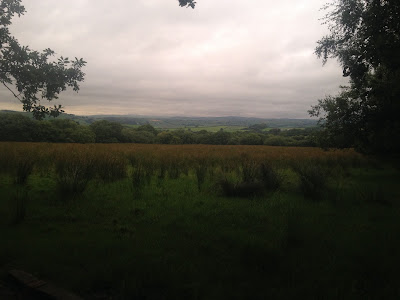Though I am in Wales, I have met surprisingly few actual
Welsh people. The host is from Manchester, the English WWOOFer is from
Manchester, and the other 3 WWOOFers are French. Thus far, my encounters with
the Welsh have mostly been characterized by both parties struggling to
understand the other’s accent, with a lot of laughing and shrugging and
apologizing, but not much actual comprehension.
My French,
on the other hand, is coming back to me rapidly. When we first met, I told the
French WWOOFers that I spoke a little bit of French, but had forgotten most of
it. However, as I’ve become accustomed to hearing the language spoken
constantly, all those years of French class have kicked in.
My French
friends, however, have been acting under the assumption that I can’t understand
a word they’re saying (there hasn’t been a single bit of fun gossip to
overhear, which certainly helps my paranoia, anyway). So when, at lunch one day,
one of them said “Comment dit-on ‘glace’ en anglais?” (“how do you say ‘ice’ in
English?”) and I automatically responded
“ice,” everyone froze and stared at me as if I had just started singing
opera.
It was quite entertaining, and now
I’ve gotten into the habit of interjecting my responses in English to their
questions and statements in French. It still gives them some pause, but it’s
made conversations vastly easier knowing that if we reach a word or phrase that
doesn’t translate well, usually someone can figure it out.
So while I’ve had very little
exposure to Welsh culture, I’m learning all sorts of fun things about France
and French culture. A couple of weeks ago, they taught me to play a French card
game called tarot (similar to spades or hearts, but more complex). Well, I say
they taught me, but after realizing that not even the suits translate well, I
ended up reading the rules on my phone and then playing a few terrible rounds
before finally realizing that they play aces low and have a card between the
jack and the queen.
They also have sugar-addictions to
rival my own, so we’ve spent many nights playing cards while grazing from a
large pile of Kinder and assorted British cookies. At this point, it is simply
implied that if one person eats a triangle of Toblerone or a digestive biscuit
or a bueno, the others also want one, and I’ve been conditioned to stick my
hand out expectantly every time I hear the rustling of candy wrappers. Let’s
just say, it’s good that I’m doing manual labor all day.
Besides chocolate, we also share a
love for Harry Potter. I was delighted to find out that in the French version
of the series, many things and people have been renamed to make sense in
French. So Neville Longbottom is actually Neville Londubat and Hufflepuff is
Poufsouffle (for some reason Slughorn is still Slughorn, though).
The funny thing about the language
barrier is that it takes a lot longer to learn much of anything significant
about the people you’re talking to. It’s served as a natural division between
the native French speakers and the native English speakers, even though everyone
resents that such a separation exists. So even though we’ve been together
almost constantly for the past month, I feel as if we’ve only just started to
know each other.
On Thursday, I went to town with 2
of the French WWOOFers and we sat at lunch and talked almost completely
unhindered for a couple hours, the kind of conversation where you don’t even
notice that time is passing, then a couple hours after that while we walked
around Aber until the next bus. Perhaps that sounds normal under, well, normal
circumstances, but I think it was the first time it’s felt so effortless for
everyone to be able to speak and understand for longer than a couple sentences.
Just in time for them to go back to
France, unfortunately, but that does seem to be the nature of WWOOfing: to
spend almost every waking hour with these people, to endure such horrors as
mucking out the chicken coops together, to be each others’ sources of
entertainment when the Internet inevitably stops working, to begin to
understand each person’s quirks – who is afraid of spiders, who will always
take seconds of dessert, who always forgets sunscreen - and, in seemingly no
time at all, to return to “the real world” and once more become strangers.






